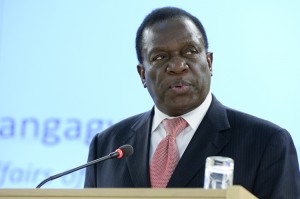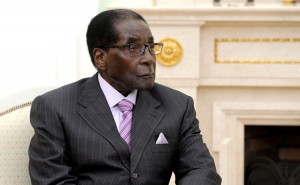Zimbabwe’s Power Transfer
December 5, 2017
On Nov. 24, 2017, Emmerson Mnangagwa was sworn in as the new president of Zimbabwe, a landlocked country in southern Africa. The transfer of government power is routine in many countries, taking place every few years or even more frequently. In Zimbabwe, however, this has not been the case. Mnangagwa’s presidency followed the 37-year reign of President Robert Mugabe—a period that covers the entire short and volatile history of the Republic of Zimbabwe.

Emmerson Mnangagwa became Zimbabwe’s second president on Nov. 24, 2017. Credit: Jean-Marc Ferré, UN Photo
Since the late 1800′s, the area that is now Zimbabwe has had a troubled, often violent, political history. The vast majority of Zimbabwe’s people are black Africans, but whites (and the United Kingdom) controlled the country from about 1890 to 1979. During the last decade of white rule, black nationalists in Zimbabwe—then called Rhodesia—engaged in guerrilla warfare against the government. The first black-majority government was elected in 1979. However, many people rejected this government, and guerrilla violence continued. A cease-fire led to new elections in 1980, and Robert Mugabe, one of the principal rebel leaders, became prime minister (and later president) of the independent nation of Zimbabwe.

President Robert Mugabe dominated Zimbabwe politics for 37 years. Credit: The Office of the President of Russia (licensed under CC BY 4.0)
After gaining power, Mugabe faced down armed rebellions and decades of political opposition. He also won numerous disputed elections often marred by violence and voter intimidation. His policies benefited political allies and parts of the nation’s population (and greatly enriched himself and his family), while people who resisted his rule often lost their homes, their land—even their freedom. Zimbabwe’s economy suffered badly under Mugabe, and millions of people lived in abject poverty.
In 2017, Mugabe—now 93 years old and perhaps sensing the end was near—finally pushed things too far. On November 6, Mugabe fired Vice President Mnangagwa, clearing the way for Grace Mugabe, his 52-year-old wife, to take the post and succeed him as president at the end of his term in 2018. After the firing, Mnangagwa fled to South Africa, and the seeds of unrest sprouted in Harare, Zimbabwe’s capital city and long a hotbed of anti-Mugabe sentiment.
On November 14, Zimbabwe’s military turned against Mugabe, and tanks rumbled through the streets of Harare. On November 15, Mugabe was placed under house arrest (purportedly for his own safety), but the military denied that it had staged a coup d’etat (forced government takeover). Violent protests called for Mugabe to officially step down, but he initially refused. Finally, on November 21, as Zimbabwe’s parliament began impeachment proceedings to remove Mugabe, the self-styled “Grand Old Man” of African politics resigned.
Emmerson Mnangagwa (who is 75 years old) reentered the country on November 22. Two days later he became just the second president in Zimbabwe’s history. The position is potentially a temporary one, as he is listed as an interim replacement until elections scheduled for September 2018.


